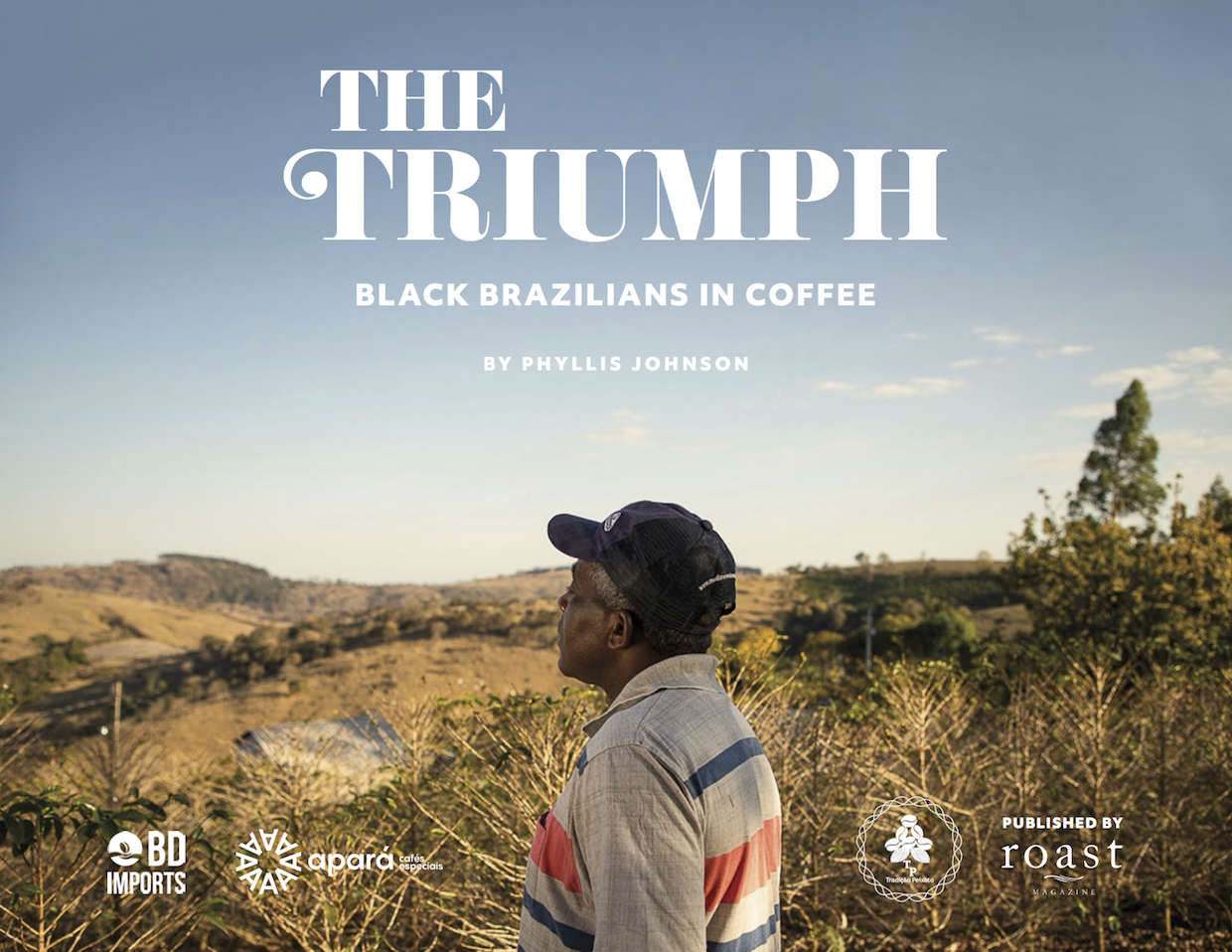Phyllis Johnson has announced the launch of her new book, “The Triumph: Black Brazilians in Coffee.”
The book addresses the centuries-old history of slavery in the Brazilian coffee sector that has shaped modern-day dynamics in the coffee trade. It also follows the experiences of Black, first-generation landowners who are currently producing specialty coffee.
“My hope is that this book will not only enlighten but also challenge the global coffee trade to consider more inclusive supply partners,” said Johnson, who is the founder of Atlanta-area coffee trading company BD Imports and the founding director of the Coffee Coalition for Racial Equity.
Roast magazine is honored to have volunteered its efforts in publishing “The Triumph.” All proceeds of the book, which is available at the BD Imports website in soft cover or digital forms, will be split between coffee farmers and the Coffee Coalition for Racial Equity.
Johnson’s BD Imports issued the following press release today:
The Journey to Building Racial Equity in Specialty Coffee, highlighted in Phyllis Johnson’s book, “The Triumph: Black Brazilians in Coffee”
Atlanta, Georgia — Had the journey started with sharecropping, it may have been shorter and possibly easier to move into landownership and one day compete in the high-end specialty coffee industry, but it stared well before that. It’s common knowledge that enslavement went hand in hand with agriculture production throughout the Americas, encompassing crops such as cotton, sugar, and, yes, coffee. It started with generations of enslavement in production, followed by generations of sharecropping, and finally for a few, landownership. A step further would be producing top quality specialty coffees and finding a global market. Phyllis Johnson’s new book, “The Triumph, Black Brazilians in Coffee,” highlights families who are finding new pathways.
In Johnson’s 20 years of working as a green coffee importer she noticed the absence of prominent Black Brazilians in the trade. Relationships established through the International Women’s Coffee Alliance Brazil chapter gave way for Johnson to learn more about the status of Black Brazilians in the industry. Visits to Brazil and meetings with the farmers allowed Johnson a chance to understand some of the challenges. Few Black families owned coffee farms, and many worked in the fields throughout generations as sharecroppers or employees. The lack of cashflow keeps farmers from being able to sell into the international market therefore, their coffees are sold at a lower price level locally. There’s a lack of understanding in how the international market works, in addition to the language barrier.
“My hope is that this book will not only enlighten but also challenge the global coffee trade to consider more inclusive supply partners,” says Johnson.
After meeting Miriam Aguiar of Fazenda Cachoeria, a Brazilian organic farmer, both Johnson and Aguiar decided to join forces and explore opportunities. Aguiar didn’t have to look far, she’d heard about a Black family that owned a coffee farm not far from her family’s plantation. On a trip to the country in 2015 both Johnson and Aguiar visited the family together for the first time.
“If Black growers are recognized internationally for their work, our local market will grow stronger,” says Aguiar. The families highlighted in the book are first generation landowners, producing specialty grade coffees. Their dreams of one day selling into the international specialty market becomes a reality. Their stories don’t end with the book. Johnson and Aguiar engaged as business partners in teaching about quality production to purchasing coffees from the families due to arrive in the U.S. in late December this year. The coffees are being marketed as the 132 Collection. Over time they hope to add more producers to the program.
The proceeds from the sale of the book will be split between the famers and Coffee Coalition for Racial Equity, a newly formed U.S. based organization founded by Johnson to improve racial equity in the U.S.
“Our families are pleased to share our stories, it’s our pleasure to give back to an organization that supports racial equity, we feel proud to be involved,” says Neide Peixoto from Tradição Peixoto.
Nick Brown
Nick Brown is the editor of Daily Coffee News by Roast Magazine.







Comment